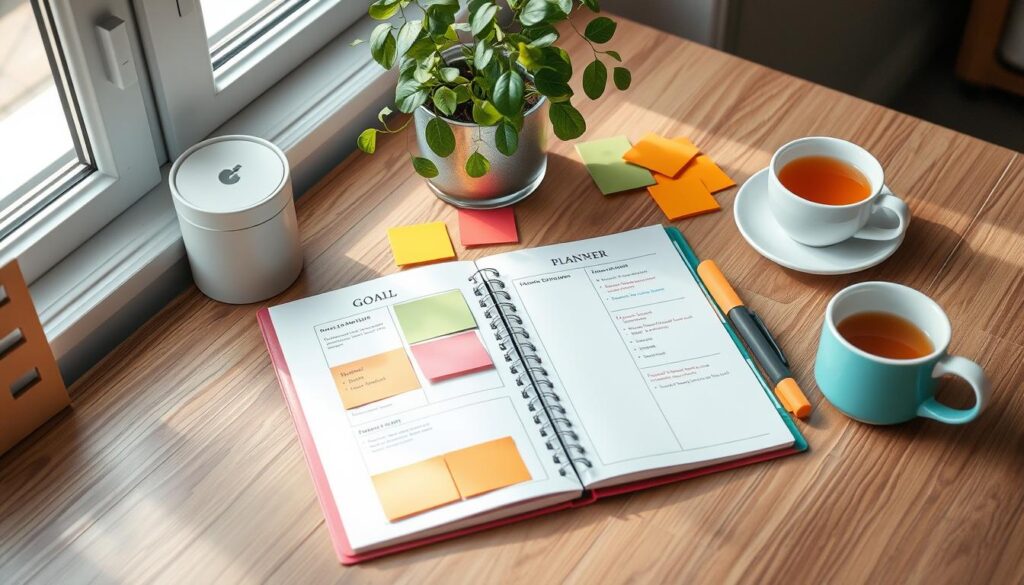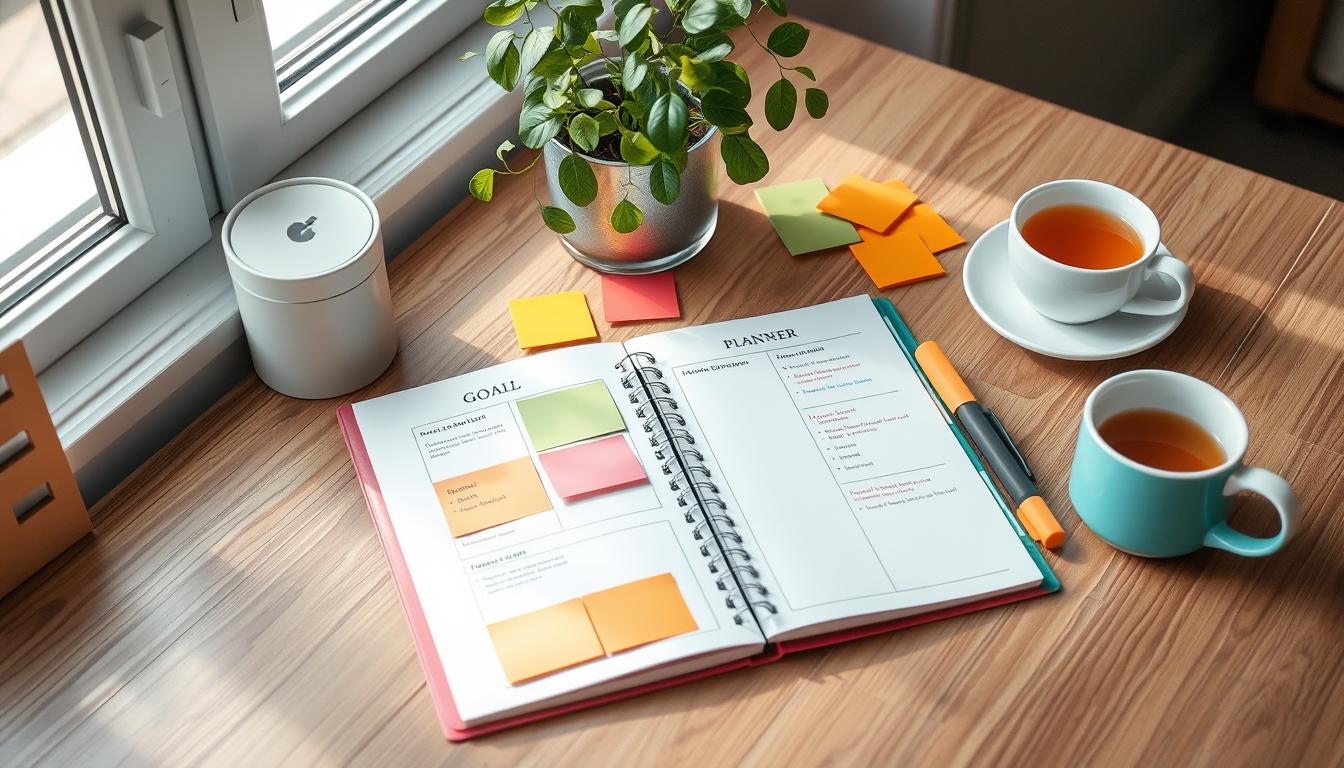In today’s fast world, success often seems to depend on talent, luck, or privilege. But one quality stands out as a true game-changer: diligence. This virtue, when harnessed, can transform lives, unlock potential, and push people towards their biggest goals.
Diligence is the unwavering commitment to hard work and perseverance. It’s the foundation of lasting achievements. Whether you aim to excel in your career, improve your health, or make a big impact, diligence will guide you to success.
What is Diligence?
Diligence is a key trait that includes many important qualities. It means working hard and never giving up to reach a goal. It’s the base of success, as it makes people focus and work hard.
Diligence has several key traits. These include paying attention to details, having a strong work ethic, and always trying to get better. People who are diligent are careful and precise in their work. They stay organized, manage their time well, and always try their best.
Diligence as a Driving Force
Diligence pushes people towards their goals. Diligent individuals don’t give up, even when things get tough. Their hard work and focus often lead to great achievements, making them stand out.
| Diligence Characteristics | Diligence Importance |
|---|---|
|
|
Understanding diligence and its role in success is key. By embracing this trait, people can reach their full potential.
The Benefits of Being Diligent
Diligence is a powerful trait that can unlock many benefits. It leads to increased productivity and better time management. These advantages are vast and impactful.
Increased Productivity
Being diligent makes you more focused and efficient. You can avoid distractions and get more done in less time. This boosts your productivity, helping you reach your goals faster.
Improved Time Management
Diligence helps you manage your time better. You learn to prioritize tasks and plan your day well. This keeps you on track and frees up time for other important things.
Diligence offers more than just immediate benefits. It brings a sense of accomplishment and confidence. It helps you excel in your career, reach personal goals, or simply enjoy each day more.
Cultivating a Diligent Mindset
Building a diligent mindset is key to reaching your goals and reaching your full potential. By planning your daily tasks well, you can develop the habits and strategies to stay focused and productive.
Setting realistic goals is a big part of being diligent. Creating clear, achievable objectives helps guide your efforts and track your progress. It’s also important to know your priorities and make a plan that fits your long-term goals.
Another important part is overcoming procrastination. Knowing what makes you procrastinate and finding ways to deal with it helps you stay on track. This way, you avoid getting sidetracked and delayed.
| Diligence Strategies | Benefits |
|---|---|
| Setting Realistic Goals | Provides a clear roadmap and sense of direction |
| Identifying Priorities | Ensures you focus on the most important tasks |
| Overcoming Procrastination | Helps you stay on track and avoid delays |
To cultivate a diligent mindset, you need to commit to consistent habits and routines. A structured daily routine helps you avoid distractions and boosts your productivity. Also, celebrating your small victories keeps you motivated and helps you stay diligent on your journey to success.
Remember, becoming diligent is a journey that takes time, self-reflection, and a willingness to learn and grow. By using these strategies, you can tap into the power of diligence and reach your highest goals.
Setting Realistic Goals
Starting your journey to success begins with setting goals. But not all goals are the same. It’s key to aim for realistic goals that match your priorities and skills. This approach boosts your success chances and keeps you motivated.
Identifying Your Priorities
First, take a moment to think about what’s important to you. What areas of your life do you want to enhance? Write down your top priorities. This list will guide you in setting goals that are both meaningful and rewarding.
Creating a Plan of Action
After pinpointing your priorities, it’s time to outline your plan. Break down big goals into smaller, achievable steps. Set deadlines for each task. This strategy helps you stay focused and ensures you’re moving forward steadily.
| Goal-Setting Techniques | Prioritizing Tasks | Creating Action Plans |
|---|---|---|
|
|
|
Setting realistic goals is the first step to developing diligence. By focusing on what’s important and planning carefully, you’re on the path to success. You’ll reach your goals and unlock your full potential.

Overcoming Procrastination
Procrastination is a big obstacle in our journey to diligence. It can stop our plans and hurt our productivity. But, knowing what triggers procrastination and using the right strategies can help us overcome it.
Recognizing Procrastination Triggers
The first step to beat procrastination is to find out what makes us delay tasks. These reasons can differ for everyone. But, some common ones include:
- Feeling overwhelmed by the complexity or perceived difficulty of a task
- Lacking a clear understanding of the task or the desired outcome
- Experiencing a lack of motivation or personal interest in the work at hand
- Facing distractions or temptations that provide an easy escape from the task
- Perfectionism and fear of failure, leading to a reluctance to start
Knowing these triggers helps us find ways to tackle them. This way, we can take back control of our time and energy.
| Diligence | Procrastination |
|---|---|
| Consistent, focused effort towards a goal | Delaying or avoiding important tasks |
| Productive use of time and resources | Wasted time and missed opportunities |
| Sense of accomplishment and progress | Feelings of guilt, stress, and disappointment |
| Long-term success and personal growth | Stagnation and missed deadlines |
Understanding the difference between diligence and procrastination helps us make the right changes. It guides us in building the habits needed for success.
Staying Motivated and Focused
Keeping your motivation and focus is key to being diligent. After setting your goals and making a plan, the real challenge is staying dedicated. Luckily, there are ways to keep your drive strong and your eyes on the goal.
Finding Your “Why”
Finding your “why” is the first step to staying motivated. What drives you? Is it for your family, community, or a dream? Connecting with your core motivation boosts your drive and purpose.
Celebrating Small Wins
It’s vital to celebrate your small victories. Celebrating progress boosts your sense of diligence and focus. Acknowledge your achievements, no matter how small. It’s a way to reward yourself for your hard work.
By finding your “why” and celebrating small wins, you build a mindset of staying motivated and focused. This helps you reach your goals through diligence.
The Power of Consistency
Consistency is key to diligence. It’s the steady effort towards your goals that makes a difference. We’ll look at how consistency can help you build lasting success.
Consistency isn’t about being perfect; it’s about keeping at it. Showing up every day, even when it’s hard, is crucial. By creating consistent routines, you can use consistency and diligence to move forward.
Building habits is essential for consistency. When diligence becomes a habit, reaching your goals becomes easier. Building habits lays a solid base for sustainable progress in your journey.
“Excellence is not an act, but a habit. The things you do the most are the things you will do the best.” – Marva Collins
To cultivate consistency, you need a new mindset. It’s about the journey, not perfection. Celebrating small wins keeps you motivated and on track.
Consistency and diligence are about steady growth, not quick success. By adopting this mindset and building habits, you can reach your goals.
Developing Diligence Habits
Cultivating diligence is a journey. Developing consistent habits can unlock your true potential. By establishing routines and minimizing distractions, you can achieve your goals more efficiently.
Establishing Routines
Creating structured routines is the foundation of diligence. A predictable schedule helps you stay focused. Identify your most productive hours and use that time for important tasks.
Incorporate habits like waking up early and setting aside time for breaks. This helps maintain focus and balance.
Eliminating Distractions
Distractions can hinder your progress. Identify and minimize distractions like social media and constant notifications. Use productivity tools to create a focused workspace.
Prioritize your tasks and learn to say “no” to non-essential activities. This helps maintain your focus and flow.
By developing diligence habits, you can achieve your goals with determination. Remember, consistency is key. Embrace diligence, and your productivity and success will soar.

“The secret of getting ahead is getting started. The secret of getting started is breaking your complex overwhelming tasks into small manageable tasks, and then starting on the first one.” – Mark Twain
FAQ
What is diligence?
Diligence means being hardworking and thorough in achieving your goals. It shows a strong work ethic and attention to detail. It also means being committed to consistent effort.
How can diligence benefit me?
Being diligent can improve your productivity and time management. It helps you achieve your goals more effectively.
What are the key strategies for cultivating diligence?
To become more diligent, set realistic goals and establish routines. Eliminate distractions and celebrate small wins to stay motivated.
How can I overcome procrastination and stay focused?
Identify what makes you procrastinate and develop diligent habits. Knowing your “why” and staying focused on your goals is key.
Why is consistency so important in developing diligence?
Consistency is the heart of diligence. By sticking to routines and habits, you make steady progress. This unlocks your full potential over time.




2 Comments
[…] by your ability to trust God, rise above challenges, and keep moving forward. With perseverance, diligence and faith, you can emerge stronger and unbreakable. Trust in God’s plan, stay resilient, and know […]
[…] The Power of Diligence […]